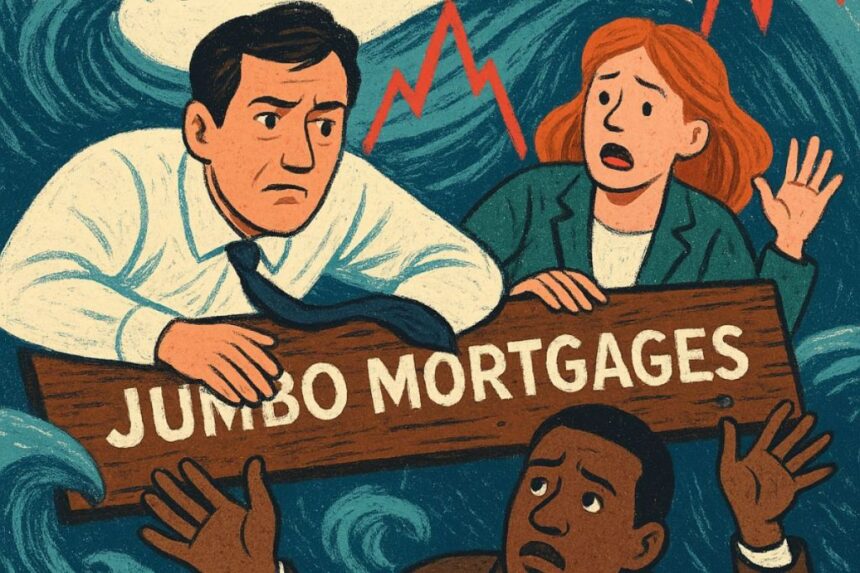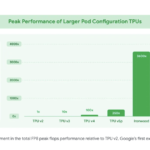
The mortgage market turbulence sparked by the global trade war has hit jumbo loans especially hard.
“The equity market tanking has caught several buyers, who are still in the escrow cycle, in a position where they will incur a huge loss if they liquidate their vested stocks, causing serious issues for their down payment,” said Depac Parthi, branch manager at American Pacific Mortgage’s Shining Star Funding branch.
Parthi’s branch is located in California’s Tri-Valley area, where average home prices exceed $1.6 million, which explains why most of his branch’s loan volume consists of jumbo mortgages.
Jumbo borrowers typically include first-time high-income earners and move-up buyers who need to sell their current home to afford a larger one. Their income often comprises base salary, bonuses, and restricted stock, Parthi explained.
But stock market volatility, driven by the trade war, is undercutting their ability to access those funds. On Thursday, the S&P 500, Nasdaq Composite, and Dow Jones Industrial Average all fell more than 4%, wiping out half of the recent gains — despite President Donald Trump announcing a 90-day pausing new tariffs for countries that negotiate.
Todd Bitter, chief sales officer at UMortgage, used his own financial situation to illustrate how stock market swings would disproportionately affect jumbo borrowers.
“Personally, on paper, I have a very substantial loss, but I’m not worried about it because I’m not touching that money for many years to come,” Bitter said. “But if I were in the market to buy a house, I would probably be a little hesitant because I can’t really sell my equities to put the money down – I’d lose so much.”
Jumbo loans — which exceed Fannie Mae and Freddie Mac‘s 2025 baseline conforming loan limit of $806,500 for one-unit properties — are typically sold in the secondary market to real estate investment trusts, hedge funds, and insurance companies. In recent years, top lenders in this space have pulled back due to regulatory risks, while others collapsed under tightening monetary policy and liquidity constraints.
The strategy is to “lie low”
This time around, interest rate volatility challenges the jumbo market. Meanwhile, in the conforming space, some loan officers have seen an uptick in home loan applications as some borrowers are “staying on course.”
“New jumbo buyers will completely back off until the stock market and interest rate volatility is back to normal levels,” Parthi said.
Historically, heightened global uncertainty would trigger a “flight to quality,” with investors moving into U.S. bonds. That demand would lower the 10-year Treasury yield — a key benchmark for mortgage rates. But the expected response hasn’t materialized as strongly.
“In the past two days (April 8 and 9), the bond market selloff is pushing up mortgage rates irrespective of what the stock market is doing,” said Lawrence Yun, chief economist at National Association of Realtors, in a social media post on Wednesday.
Yun cited three factors: tariff escalation leading to inflation and delaying a Federal Reserve rate cut; China selling U.S. Treasuries and mortgage-backed securities; and margin calls forcing investors to sell assets to raise cash.
“Low mortgage rates of last week had boosted mortgage applications to buy a home by 20% from one year ago. That momentum will slow with higher rates,” Yun added.
Bitter echoed the shift: “Usually, when we see the stock market making big sell-offs, we see money flooding into bonds. There’s a flight to safety. Now, it’s not really working to our advantage. A lot of money that was cashed out of the market is probably sitting in cash, not in bonds. They (traders) are trying to decide where to put it.”
At Mortgage News Daily, jumbo loan rates hit 7.05% on Thursday, compared to 6.92% for conforming loans. The Mortgage Bankers Association (MBA) reported last week that jumbo rates (6.65%) were also higher than conforming rates (6.61%), even as both fell from the week before. This week, however, the trend has sharply reversed.
“Jumbo rates have been worse than conforming and went up and down as well,” said Kevin Leibowitz, president of Grayton Mortgage. “I haven’t priced as many of those profiles this week.”
“Just within the last three days, jumbo rates have increased by 1%-2% across all levels,” Parthi said. “Borrowers are not locking hoping the situation will ease, but the market is not giving an opportunity to lock a low rate. The strategy for borrowers and loan officers is to lie low till a stable level is reached.”






